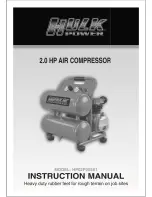
IMPORTANT SAFETY INSTRUCTIONS
RISK OF EXPLOSION OR FIRE
WHAT CAN HAPPEN
It is normal for electrical contacts within the motor and pressure
switch to spark.
If electrical sparks from the compressor come in contact with
flammable vapors, they may ignite, causing fire or explosion.
Restricting any of the compressor ventilation openings will
cause serious overheating and could cause a fire.
Unattended operation of this compressor could result in
personal injury or property damage.
HOW TO PREVENT
Always operate the compressor in a well ventilated area free of
combustible materials, gasoline or solvent vapors. If spraying
flammable materials, locate the compressor at least 20 feet
away from the spray area. An additional length of hose may be
required.
Store flammable materials in a secure location away from the
compressor.
Never place objects against or on top of the compressor.
Operate compressor in an open area at least 12 inches away
from any wall or obstruction that would restrict the flow or fresh
air to the ventilation openings.
Operate compressor in a clean, dry and well ventilated area.
Do not operate compressor indoors in a confined area.
Always remain in attendance with the compressor when it is
operating.
RISK OF BURSTING
WHAT CAN HAPPEN
1. Failure to properly drain condensed water from the tank,
causing rust and thinning of the steel tank.
2. Modifications or attempted repairs to the tank.
3. Unauthorized modifications to the unloader valve, safety
valve or any other components which control tank pressure.
4. Excessive vibration can weaken the air tank and cause
rupture or explosion.
5. Attachments & Accessories; Exceeding the operating
pressure of air tools can cause them to explode.
HOW TO PREVENT
Drain tank daily or after every use. If the tank develops a leak,
replace tank or get a new air compressor. Never drill into, weld
or make any modifications to the tank or its attachments.
The tank is designed to withstand specific operating pressures.
Never make adjustments or parts substitutions to alter the
factory set operating pressures.
For essential control of air pressure, you must install a
pressure regulator and pressure gauge to the air outlet.
RISK OF BURNS
WHAT CAN HAPPEN
Touching exposed metal such as the compressor head or
outlet tubes, can result in serious burns.
HOW TO PREVENT
Never touch any exposed metal parts on compressor during or
immediately after operation. The compressor will remain hot
several minutes after use.
Do not reach around protective shrouds or attempt
maintenance until the compressor has cooled down
completely.
RISK OF PROPERTY DAMAGE WHEN
TRANSPORTING COMPRESSOR
WHAT CAN HAPPEN
Oil can leak or spill and could result in fire or breathing hazard,
serious injury or death can result. Oil leaks will damage carpet,
paint or other surfaces in vehicules or trailers.
HOW TO PREVENT
Always place compressor on a protective mat when
transporting to protect against damage to vehicle from leaks.
Remove compressor from vehicles immediately apon arrival.
3





























